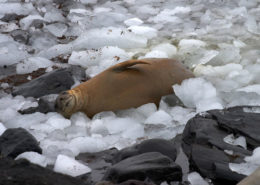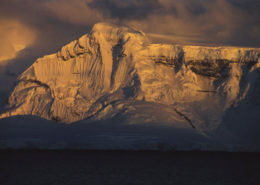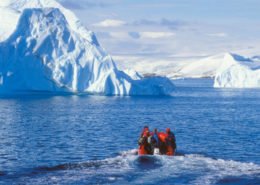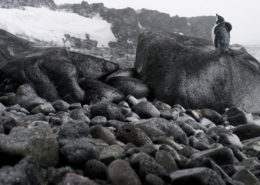Weddell Sea Quest
Day 1: Depart from Ushuaia
Embark the BOAT in the afternoon and meet your expedition and lecture staff. After you have settled into your cabins we sail along the famous Beagle Channel and the scenic Mackinlay Pass.
Day 2 & 3: Cruzando el Pasaje Drake
Named after the renowned explorer, Sir Francis Drake, who sailed these waters in 1578, the Drake Passage also marks the Antarctic Convergence, a biological barrier where cold polar water sinks beneath the warmer northern waters. This creates a great upwelling of nutrients, which sustains the biodiversity of this region. The Drake Passage also marks the northern limit of many Antarctic seabirds.
As we sail across the passage, lecturers will be out with you on deck to help with the identification of an amazing variety of seabirds, including many albatrosses, which follow in our wake. The BOAT´s open bridge policy allows you to join our officers on the bridge and learn about navigation, watch for whales, and enjoy the view. A full program of lectures will be offered as well.
The first sightings of icebergs and snow-capped mountains indicate that we have reached the South Shetland Islands, a group of twenty islands and islets first sighted in February 1819 by Capt. William Smith of the brig Williams. With favorable conditions in the Drake Passage our lecturers and naturalists will accompany you ashore as you experience your first encounter with the penguins and seals on Day 3.
Day 4 to 6: Exploring the Weddell Sea
This is where huge tabular icebergs roam. In some years, the Erebus & Terror Gulf and Weddell Sea are chock-a-block full with ice, making for exciting ice navigation. Get up early and go out on deck. It may be 3:30h in the morning, but the sunrises will be unlike anything you´ve ever seen. Huge tabular bergs break from the Larsen, Ronne, and Filchner ice shelves and combine with one-year-old and multi-year sea ice to produce a floating, undulating panorama of rugged ice scenery. All-white Snow Petrels are likely to be coursing over the floes, often joined by Pintado Petrels.
The usual passage to the east side of the Antarctic Peninsula traverses the Antarctic Sound, which is 30 miles (48 km) long and 7-12 miles (11-19 km) wide and runs northwest-to-southeast. Hope Bay and the Argentine Station Esperanza, are located on the western side of the Sound. Brown Bluff, a promontory on the Tabarin Peninsula, is located south of Hope Bay. Both of them might be possible landing sites. The Weddell Sea represents the center of the Peninsula´s Adélie Penguin population. Devil Island, Paulet Island and the already mentioned sites, might give us ample proof of this. The numbers of penguins are breathtaking. Sometimes juvenile Emperor Penguins have been sighted, riding ice floes but are by no means regular in the area.
This region also teems with vibrant exploration history. The most bizarre of these tales involves the Swedish Antarctic Expedition of 1901-03 under the command of geologist Otto Nordenskjöld. Four visitor sites have links to this expedition: Hope Bay, Paulet Island, Snow Hill Island, and Cape Well-Met on Vega Island. Our expedition staff will be pleased to share their exciting story with you. Nordenskjöld´s expedition was the first to overwinter in the Peninsula. His ship the Antarctic, under the command of the famous Norwegian whaling captain Carl Anton Larsen, was trapped in the ice and sank, but the men survived on different locations and even managed to carry out significant scientific research in the area.
Day 7 to 9: Exploring the Antarctic Peninsula and the South Shetland Islands
The Antarctic Peninsula´s remarkable history will also provide you with a type of excitement often only associated with the early explorers. You will have plenty of time to explore its amazing scenery, a pristine wilderness of snow, ice, mountains and waterways and a wide variety of wildlife. Apart from Gentoo and Chinstrap Penguins and other seabirds you are likely to encounter Weddell, crabeater and leopard seals as well as Minke whales and orcas at close range.
We hope to navigate some of the most beautiful waterways: the Gerlache Strait, Errera Channel and Neumayer Channel. Possible landing sites may include: Paradise Bay, which is perhaps the most aptly named place in the world with its impressive glacial fronts and mountains, Cuverville Island, home of the biggest Gentoo Penguin colony in the Peninsula surrounded by glaciers and castellated icebergs, and the British Museum and Post office at Port Lockroy.
Further exploration will lead us to the South Shetland Islands. The volcanic island group is a haven for wildlife. Vast penguin rookeries and seals hauling out on the shorelines make every day spent here unforgettable. Sailing through the narrow passage into the flooded caldera of Deception Island is truly amazing, so is visiting the crescent shaped island Half Moon, home to Chinstrap Penguins in breathtaking surroundings.
There might also be a chance to visit the enigmatic Elephant Island. Sir Ernest Shackleton fans will need no introduction to this historic windswept island. In 1916 Shackleton was forced to leave 22 of his men stranded on these shores, while he and five others embarked on an unbelievable last-ditch rescue attempt. What followed is one of the greatest rescue stories of all time. Every passenger will return with a greater knowledge of this gripping tale of adventure in a truly remarkable part of the world.
Day 10 to 11: At Sea. Crossing the Drake Passage, northbound
We leave Antarctica and head north across the Drake Passage. Join our lecturers and naturalists on deck as we search for seabirds and whales and enjoy some final lectures. Take the chance to relax and reflect on the fascinating adventures of the past days on the way back to Ushuaia.
Day 12: Arrival in Ushuaia
We arrive at the port of Ushuaia in the early morning and disembark the USHUAIA after breakfast.
Please note: The above itinerary is a guide only. Our exact route and program will vary to take best advantage of local weather and ice conditions and opportunities to view wildlife. Changes will be made by the Captain and/or Expedition Leader to facilitate the best results from the prevailing conditions and they will try their best to reach the Weddell Sea. However if ice conditions do not allow access the route might be changed to West Antarctica. A daily program sheet will be issued on board. Flexibility is the key to success.







